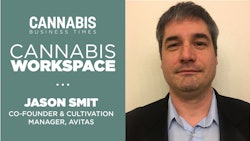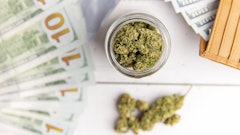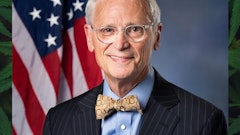
Name: Lee Henderson
Location: Portland, Ore./Hillsboro, Ore.
Title: Co-Founder/Brand Communications Manager, HiFi Farms
One word to describe your cultivation style: Scientifically retro
Cultivation type: Indoor and light-dep greenhouse
Can you share a bit of your background and how you and your company got to the present day?
My partners and I started the company four years ago. … We’ve been in business since summer of 2014, … when we founded the company. We started off as a relatively humble medical grow and quickly realized that we were pretty good at what we did. We were very lucky. We saw some early success as the industry was beginning to form and come into its own as recreational cannabis—we were at the advent of recreational cannabis here in Oregon.

We do events for the public that are consumption-friendly. HiFi Farms, we’re a very music- and culture-focused brand, so we’ve done a lot of [events] around getting people to enjoy cannabis while also enjoying a musical performance or a dance party, or we’ve even done a couple of classical music events. We try to be somewhat eclectic. We’ve done a fair amount of fundraising for local nonprofits, and we’re also … very science-focused, as far as trying to help shape the market and trying to help … get good information … to the cannabis consumer base, so they can really get the most out of their cannabis purchases as they can. I do a radio show and podcast on X-RAY.FM here … [that’s] released as a podcast on a local radio station here once a week on cannabis science and culture. We have done workshops that are open to the public about cannabis science.
What tool or software in your cultivation space can you not live without?
Scissors.
What purchase of $100 or less has most positively impacted your business in the last six months?
I want to joke and just say, lots of scissors, but that’s totally a joke.
I’m about to bring 200 pounds of what’s called “fresh frozen cannabis” to a processor to make a product called live resin. Fresh frozen is when you pull a cannabis stock out of the ground and immediately vacuum-seal it and freeze it. We just had to buy roughly $100 worth of dry ice to transport it, … so dry ice for transport because I have to drive about two hours to bring this to our processing partner.

What cultivation technique are you most interested in right now, and what are you actively studying (the most)?
We are Clean Green Certified. … Obviously, the federal government doesn’t recognize the legality of cannabis, so we can’t call ourselves organic—that’s a USDA term. But we are Clean Green Certified, which is as close as you can get to being … organic … in our space, and all of our nutrients and especially our soils—everything is OMRI [Organic Materials Review Institute] certified, which is federally recognized organic. It’s clean cannabis—that’s super important to us.
[We are] continuing to find the cleanest cultivation methods and the cleanest extraction methods and the cleanest, most environmentally sensitive [methods] from a consumer standpoint—the cleanest products. [We are exploring] cultivation methods that result in the cleanest product possible for our customers.
How has a failure, or apparent failure, set you up for later success? Do you have a “favorite failure” of yours?
It’s important to us when we choose our partners to make sure that we’re picking partners for the right reasons, and it’s more about being culturally aligned and aligned in … values, … rather than it just being a bottom-line decision for us. We find that the bottom-line decisions for us, … those partnerships tended to have not lasted and costed us money.
So, pick your partners carefully for those reasons. … Know why you want to work with somebody.
What advice would you give to a smart, driven grower about to enter the legal, regulated industry? What advice should they ignore?
Have a really good business plan. … I believe that brand is important, and when I say have a really good business plan, it’s not enough anymore just to grow great weed. You’ve got to be able to market and sell great weed. … The cannabis economy is relationships and quality, … but also sales know-how. It costs a lot of money to come into this space now. It’s really crowded, and to make a name for yourself, you’ve got to be very well capitalized, or just have a really outstanding sales plan and branding platform [and] marketing methodology because it’s a tough time, I think, for a lot of cultivators because the space is so crowded.
Advice that they should ignore, … in general, [deals with] the varieties of cannabis that people grow. Everything has to be sledgehammer-strength super weed to compete in the market—I don’t believe that to be true. Everybody thinks they have to grow 30-percent THC potency weed, and I don’t think that’s true. I think it’s hurting our business.

How do you deal with burnout?
We’re pretty tired—I won’t lie. I just got back from a vacation with my wife and children in Los Angeles. We went down to the beach in Santa Monica. I highly recommend that, but I realize that not everybody can take time off and go down to the beach.
I would just say it helps that you’re doing what you love. The hours are long, you really have to want it, and when you get to that burnout space, … it’s OK to take a break and it’s OK to regroup and it’s OK to not work four 14-hour days in a row. It’s OK to take care of yourself.
Something that’s so important to us here is the notion of fun. It’s a tough business, but we have a really good company culture here of fun. … We’re pumping ’80s music and people are harvesting outdoor weed and we’re making jokes, and we have a quirky ambiance. We have a full-size poster of Matthew McConaughey from Magic Mike in our indoor room. Be a serious person, but don’t take things so seriously that all the joy is taken out of it. Remember to have fun. Harvesting weed all day long is pretty grueling—throw the radio on! Also, drink a lot of water.
How do you motivate your employees/team?
We’re very lucky to have a pretty rad company culture here. People are very proud to work here. People really want the company to succeed. People … know what’s happening in the industry at a more macro-level, and they bring their love of their jobs and their love of this company to work on a regular basis. … Our staff is a beautiful community and they really regulate each other.

What keeps you awake at night?
I don’t really worry about the federal government, [but] I would say the unknown. This is a nascent business. We’re a young company and a young industry. … We’re laying down the track as the train is moving. We’re establishing the norms, we’re establishing the market, we’re establishing the cultural folk ways of this business, and also the business metrics themselves, in real time. This isn’t traditional agriculture. This isn’t tech. This isn’t retail. It’s an anomalous and unique thing we’re doing, so I would just say the unknown, but for those reasons.
What helps you sleep at night?
Honestly, what helps me sleep at night is that I’m very proud of the brand name that we’ve made for ourselves. … I’m very proud of the brand we’ve built … and our company values and what we’re known for. I think it really resonates with our audience and the market here, and I feel like we in many ways stand apart from other more traditional cannabis companies for that reason, and I’m very proud of that and I feel like it helps us. We have a competitive advantage because of who we are and what we’ve done and what we’ve brought to this … burgeoning industry.
Editor’s Note: This interview has been edited for length and clarity.
Photos courtesy of HiFi Farms


























